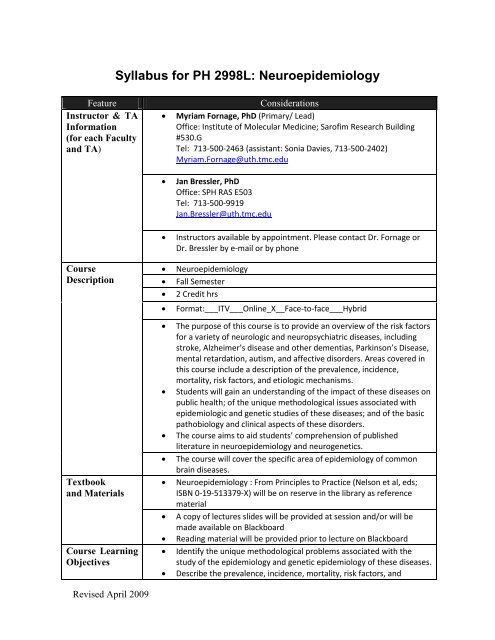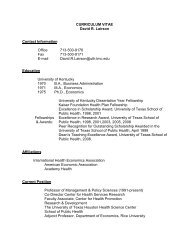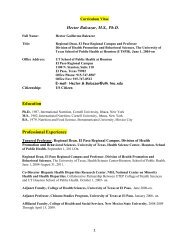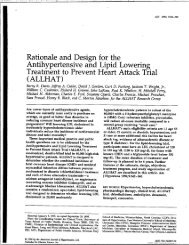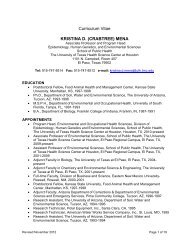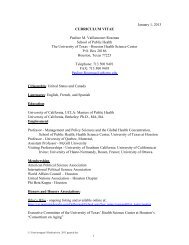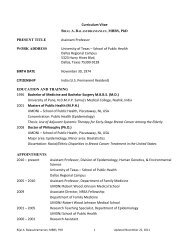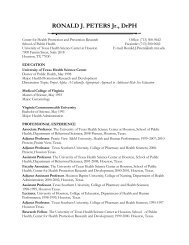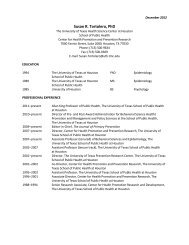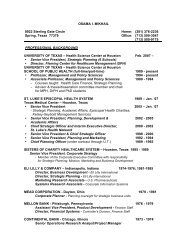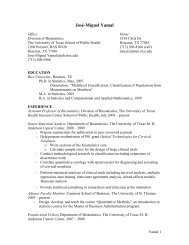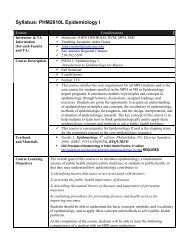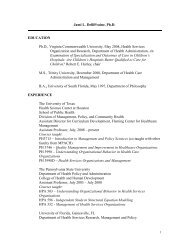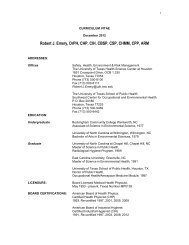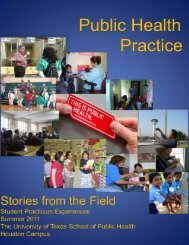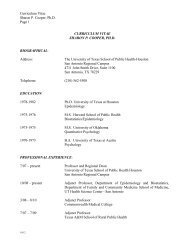Syllabus for PH 2998L - University of Texas School of Public Health
Syllabus for PH 2998L - University of Texas School of Public Health
Syllabus for PH 2998L - University of Texas School of Public Health
Create successful ePaper yourself
Turn your PDF publications into a flip-book with our unique Google optimized e-Paper software.
Revised April 2009<br />
<strong>Syllabus</strong> <strong>for</strong> <strong>PH</strong> <strong>2998L</strong>: Neuroepidemiology<br />
Feature Considerations<br />
Instructor & TA<br />
In<strong>for</strong>mation<br />
(<strong>for</strong> each Faculty<br />
and TA)<br />
Course<br />
Description<br />
Textbook<br />
and Materials<br />
Course Learning<br />
Objectives<br />
• Myriam Fornage, PhD (Primary/ Lead)<br />
Office: Institute <strong>of</strong> Molecular Medicine; Sar<strong>of</strong>im Research Building<br />
#530.G<br />
Tel: 713-500-2463 (assistant: Sonia Davies, 713-500-2402)<br />
Myriam.Fornage@uth.tmc.edu<br />
• Jan Bressler, PhD<br />
Office: S<strong>PH</strong> RAS E503<br />
Tel: 713-500-9919<br />
Jan.Bressler@uth.tmc.edu<br />
• Instructors available by appointment. Please contact Dr. Fornage or<br />
Dr. Bressler by e-mail or by phone<br />
• Neuroepidemiology<br />
• Fall Semester<br />
• 2 Credit hrs<br />
• Format:___ITV___Online_X__Face-to-face___Hybrid<br />
• The purpose <strong>of</strong> this course is to provide an overview <strong>of</strong> the risk factors<br />
<strong>for</strong> a variety <strong>of</strong> neurologic and neuropsychiatric diseases, including<br />
stroke, Alzheimer’s disease and other dementias, Parkinson’s Disease,<br />
mental retardation, autism, and affective disorders. Areas covered in<br />
this course include a description <strong>of</strong> the prevalence, incidence,<br />
mortality, risk factors, and etiologic mechanisms.<br />
• Students will gain an understanding <strong>of</strong> the impact <strong>of</strong> these diseases on<br />
public health; <strong>of</strong> the unique methodological issues associated with<br />
epidemiologic and genetic studies <strong>of</strong> these diseases; and <strong>of</strong> the basic<br />
pathobiology and clinical aspects <strong>of</strong> these disorders.<br />
• The course aims to aid students’ comprehension <strong>of</strong> published<br />
literature in neuroepidemiology and neurogenetics.<br />
• The course will cover the specific area <strong>of</strong> epidemiology <strong>of</strong> common<br />
brain diseases.<br />
• Neuroepidemiology : From Principles to Practice (Nelson et al, eds;<br />
ISBN 0-19-513379-X) will be on reserve in the library as reference<br />
material<br />
• A copy <strong>of</strong> lectures slides will be provided at session and/or will be<br />
made available on Blackboard<br />
• Reading material will be provided prior to lecture on Blackboard<br />
• Identify the unique methodological problems associated with the<br />
study <strong>of</strong> the epidemiology and genetic epidemiology <strong>of</strong> these diseases.<br />
• Describe the prevalence, incidence, mortality, risk factors, and
Learning<br />
Activities<br />
Student<br />
Assessment<br />
And Grading<br />
Criteria<br />
Prerequisites<br />
and/or<br />
Technical<br />
Requirements<br />
Policies<br />
and Procedures<br />
Revised April 2009<br />
etiologic mechanisms.<br />
• Describe the impact <strong>of</strong> neurologic diseases on public health<br />
• Describe the methodologies to identify genes influencing neurological<br />
diseases<br />
• Describe basic pathophysiology and clinical aspects (symptomatology,<br />
diagnosis, and treatment) <strong>of</strong> major neurologic diseases<br />
• Student will learn to critically appraise published literature in<br />
neuroepidemiology and neurogenetics by presenting selected papers<br />
<strong>for</strong> issues related to study rationale/ hypothesis, design, analysis, and<br />
interpretation<br />
• Letter grade (A,B,C,F or I) based on class attendance (20%); a student<br />
presentation (40%) and final in class examination (40%). Final grades<br />
will be assigned as follow: A(≥90); B(≥80); C(≥70); F(
Course Calendar<br />
Revised April 2009<br />
• Incomplete Grades:<br />
o Consideration <strong>for</strong> incomplete grades will be made on a caseby-case<br />
basis. Students should contact the instructor directly.<br />
Incomplete grades will not be granted because <strong>of</strong> poor<br />
per<strong>for</strong>mance.<br />
• Students are expected to attend class regularly<br />
• Academic Dishonesty<br />
o Current school policy applies. See<br />
http://www.sph.uth.tmc.edu/uploadedfiles/catalog.pdf<br />
o Evidence <strong>of</strong> academic dishonesty will result in grade F<br />
o It is assumed that, <strong>for</strong> group activities, all students will<br />
contribute to the assignment and will not take credit <strong>for</strong> work<br />
accomplished by others.<br />
• E-mail Procedures and online etiquette<br />
o Include course number in subject line <strong>for</strong> all e-mail<br />
correspondence<br />
• Separate Document


